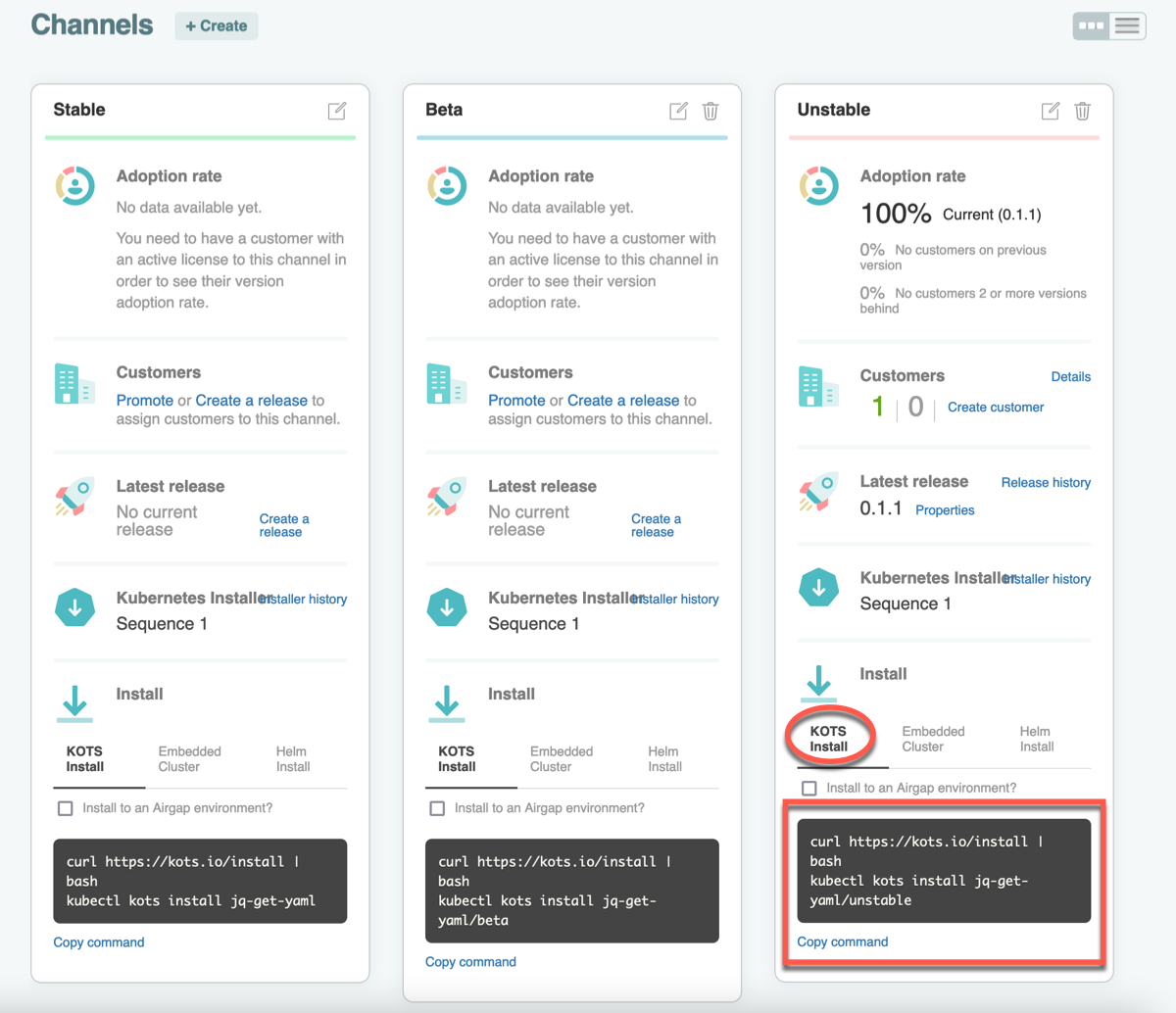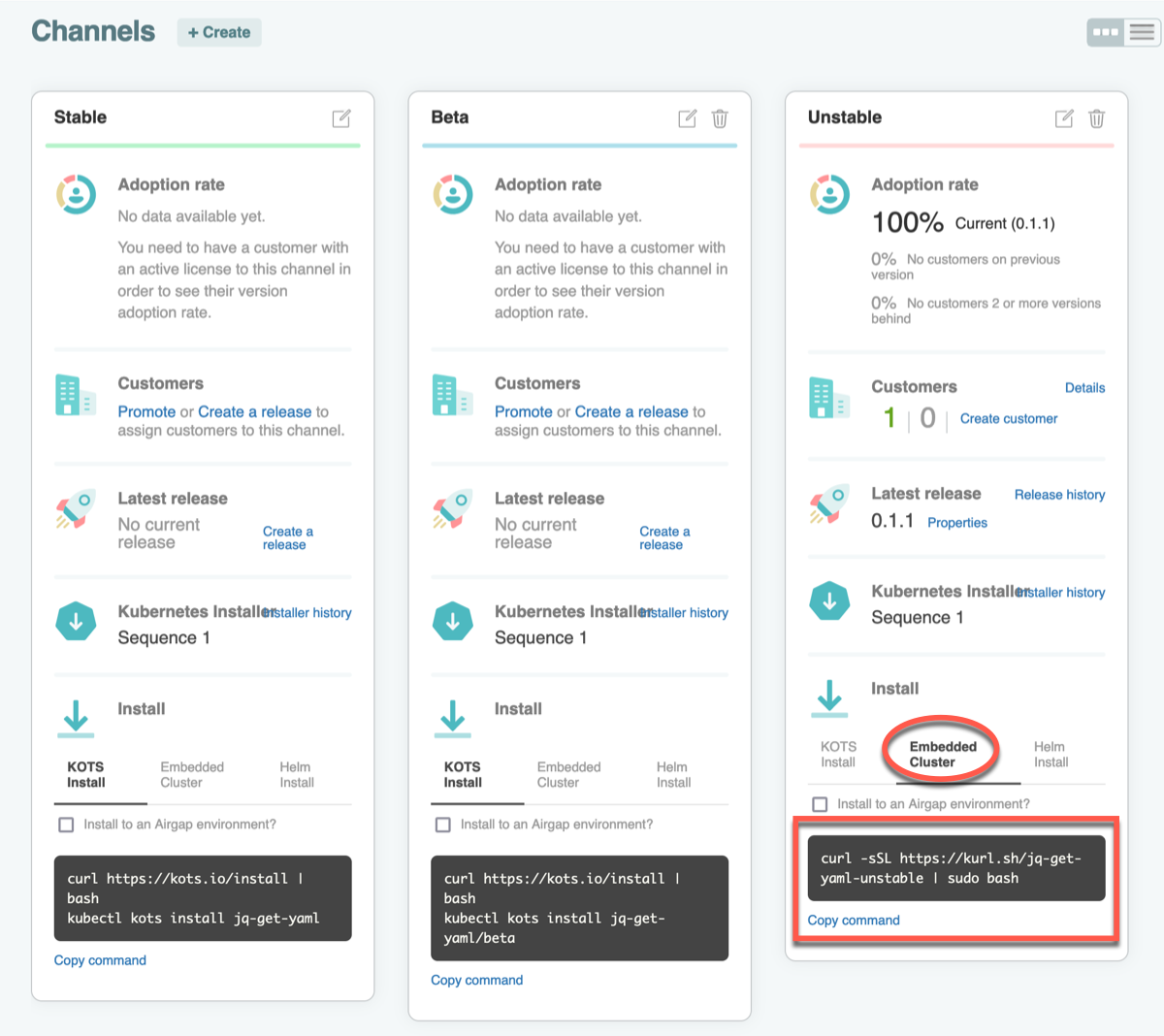Step 4: Install the App Manager
Get the installation commands from the Unstable channel so that you can test the installation process for the application release that you promoted. The first step in installing and deploying the application in your Kubernetes cluster is to install the Replicated app manager.
The app manager is the Replicated component that lets your users install, manage, and upgrade your application. Users can interact with the app manager through a user interface, called the Replicated admin console, or through a CLI, called the kots CLI.
The app manager can be installed into an existing Kubernetes cluster, or using the Replicated Kubernetes installer on a virtual machine (VM). The Kubernetes installer provisioned cluster is also known as an embedded cluster.
Choose either installation option:
Install in an Existing Cluster
When you install the app manager on existing cluster, you use a pre-built Kubernetes cluster and deploy your application into a namespace.
You can see the installation script options at the bottom of each channel on the Channels page in the vendor portal.

To install the app manager:
Copy the KOTS Install command from the Unstable channel in the vendor portal. Make sure your kubectl context is set to your existing cluster and run the install command on the command line.
The script installs the latest app manager version as a
kubectlplugin. For more information about installing an application with the kots CLI, see install in the kots CLI documentation.Example:
curl https://kots.io/install | bash
kubectl kots install my-test-app/unstableFor
Enter installation path (leave blank for /usr/local/bin):, use the default and press Enter.For
Enter a new password to be used for the Admin Console:, provide a password to access the admin console. You use this password in a later step to access the admin console user interface and deploy the application.When the admin console is ready, the script prints the https://localhost:8800 URL where you can access the admin console.
Example output:
Enter the namespace to deploy to: my-app-unstable
• Deploying Admin Console
• Creating namespace ✓
• Waiting for datastore to be ready ✓
Enter a new password to be used for the Admin Console: ••••••••
• Waiting for Admin Console to be ready ✓
• Press Ctrl+C to exit
• Go to http://localhost:8800 to access the Admin ConsoleGo to the Next step section.
Install in a Kubernetes Installer Cluster
The app manager can be installed as a Kubernetes installer provisioned cluster (embedded cluster), which provisions a plain virtual machine (VM).
You can see the installation script options at the bottom of each channel on the Channels page in the vendor portal. For this tutorial, you use the Embedded Cluster option for the Kubernetes installer.

To install the app manager on a VM using the Kubernetes installer:
Use SSH to authenticate to the VM that you created as part of Set Up the Environment.
Example:
gcloud compute ssh NAMEReplace NAME with the name of the cluster.
Copy the Embedded Cluster command from the Unstable channel in the vendor portal and run it on the cluster.
Example:
curl -sSL https://kurl.sh/my-test-app-unstable | sudo bashThis script installs Docker, Kubernetes, and the Replicated admin console containers (kotsadm).
Installation takes approximately 5-10 minutes.
Note the connection URL and password that displays in the output. The password is not shown again. You must use these in a later step to deploy the admin console.
Example output:
Kotsadm: http://[ip-address]:8800
Login with password (will not be shown again): [password]Reload your shell to access the cluster with
kubectl:bash -lRun a
kubectlcommand to test thatkubectlis working.Example:
kubectl get podsExample output:
NAME READY STATUS RESTARTS AGE
kotsadm-79dcb4dc7d-2xh85 1/1 Running 0 60m
kotsadm-postgres-0 1/1 Running 0 60m
kurl-proxy-kotsadm-5f7fb75f47-b7jbz 1/1 Running 0 60mAt this point, Kubernetes and the Replicated admin console are running, but the application is not deployed yet.
Next Step
Continue to Step 5: Deploy the Application to log in to the admin console and deploy the application.